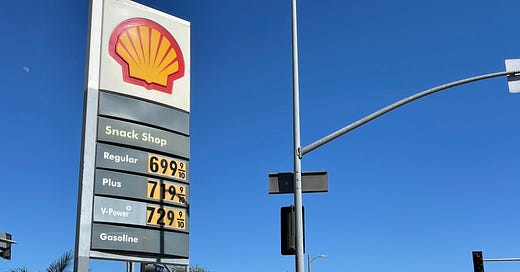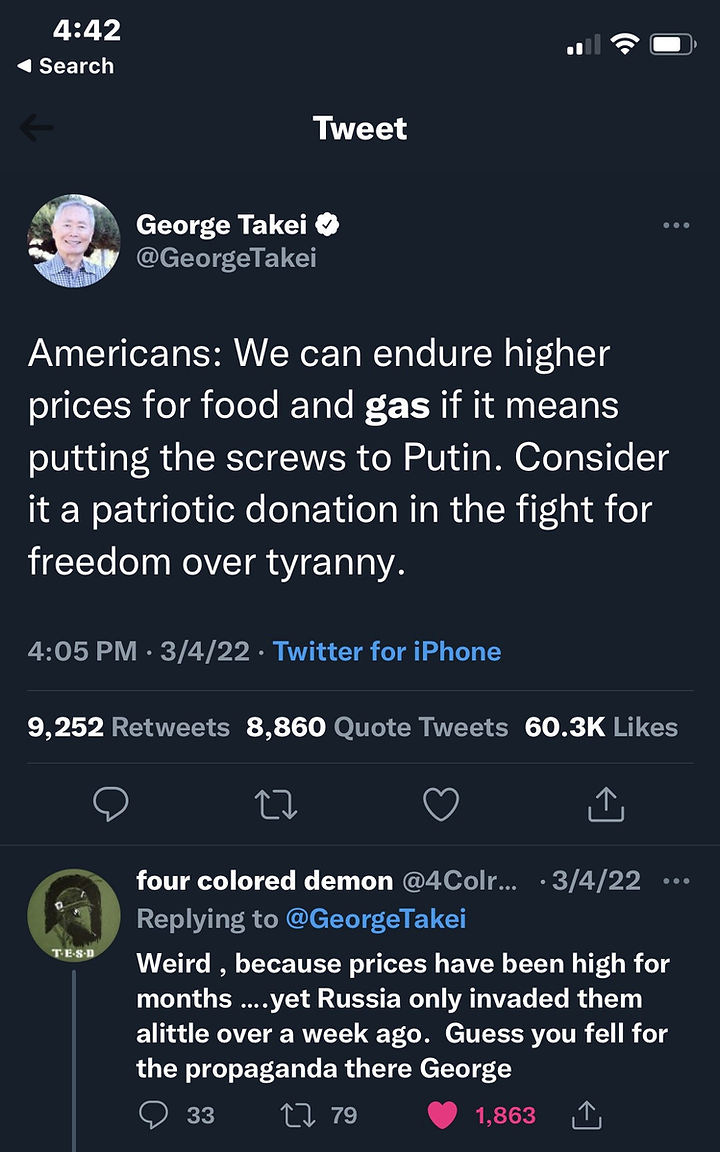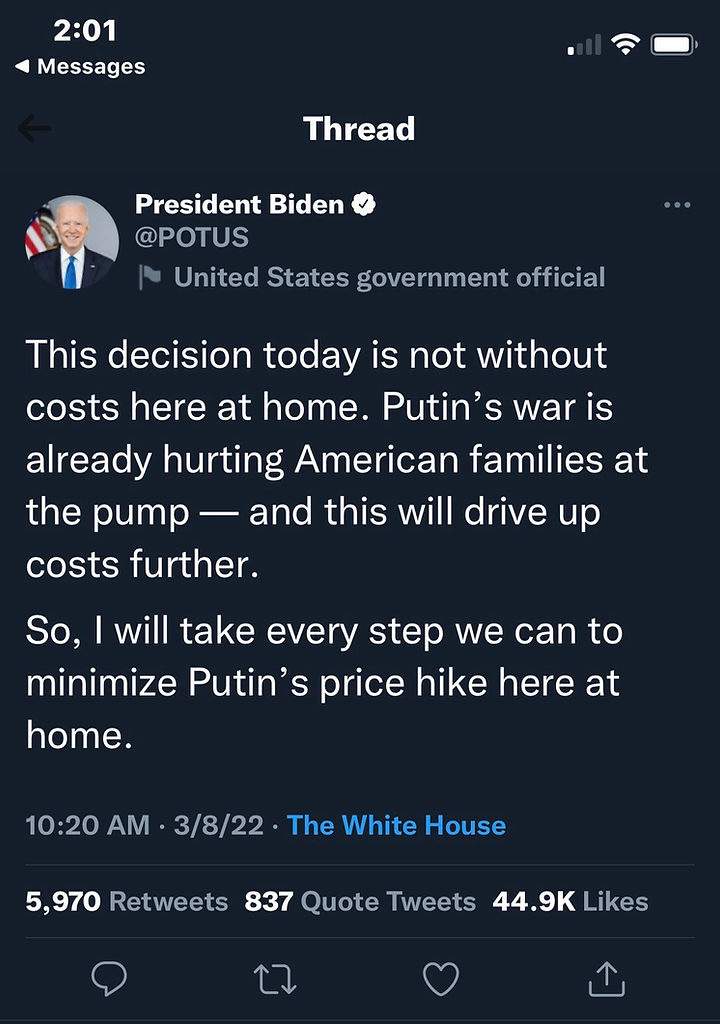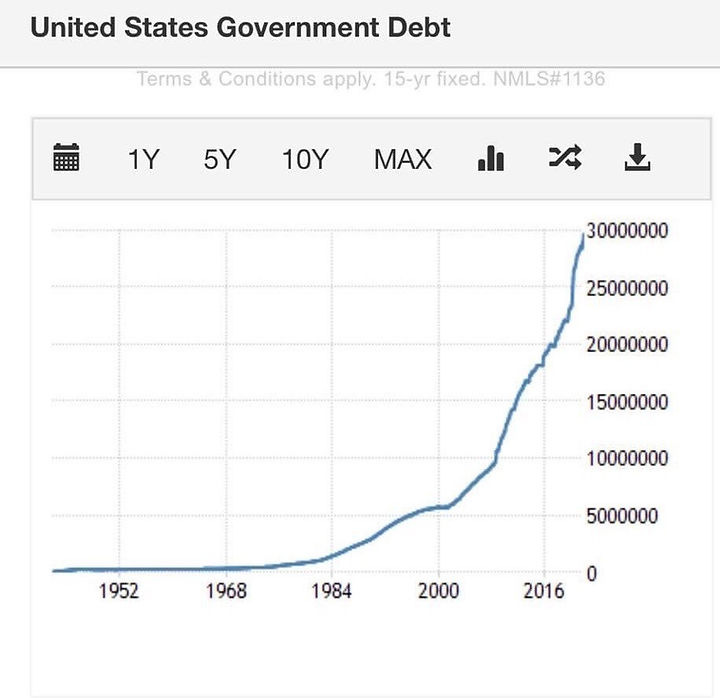The Price of Supporting Ukrainian Freedom Is Much Higher Than We're Told (Part One)
Sanctions will hurt Americans as much — if not more — than Russians and lower our standard of living
[NOTE: Economics isn’t a sexy topic, but we all need to understand what’s coming to America very soon — and more important, why it’s coming. I’ve split this article into two parts because it will be easier to digest in chunks.
I loathe war anywhere, for any reason, and Ukraine is no exception.
I don’t take lightly the fact that innocent people have been forced from their homes, their families ripped apart, and their country destroyed. What’s happening in Ukraine is a humanitarian tragedy on a scale that I can’t and won’t minimize.
But I also loathe hypocrisy. I can’t ignore the fact that U.S. imperialism — masquerading as wars for freedom and democracy — has claimed more lives and destroyed more countries than many Americans either know or care to remember. I also can’t ignore the fact that the roots of this crisis run deeper and are far more complicated than many people seem to realize (excellent and well-balanced summaries can be found here and here and here). So I reject the media caricatures of “good” guys vs “bad” guys” that give us an almost cartoonish understanding of the Ukrainian conflict.
This doesn’t mean I excuse or condone Russia’s aggression, just as I didn’t excuse or condone the U.S. invasion of Iraq, a war based on what we later learned was flawed intelligence. I’m merely pointing out that modern wars are a lot like consumer products; they’re branded and sold to us. When launched by Western nations, they’re hailed as justifiable and necessary; when our enemies wage them, they’re despicable.
The point of this article isn’t to address the politics of war, but to draw your attention to the bigger picture unfolding: the consequences of war. Because regardless of where you stand on Ukraine, and despite what we’re hearing in the media, it’s important to understand that the U.S. has picked a fight with Russia it likely can’t win. Americans have virtually nothing to gain and much more to lose than rooting-for-Ukraine cheerleaders realize.
Events are quickly unfolding under the radar that may soon devastate the American economy. I’m going to break down these important repercussions for you as simply as I can. I won’t use fancy economic jargon that will make your eyes glaze over, because you don’t need fancy jargon to understand how what’s coming will affect our ability to pay our mortgages, rent, gas, food, utilities, car repairs, tuition, and virtually everything else we need.
What’s coming has been brewing for a very long time, and our government will almost certainly blame President Vladimir Putin, just as they’ve made him the scapegoat for surging gas prices. But the reality is that the U.S. government is primarily responsible for the looming economic catastrophe.
My goal isn’t to frighten you, but rather to keep you from being blindsided. Because when we’re prepared, we’re grounded and balanced in our reactions. We can make rational decisions. We don’t fall into the trap of blaming the wrong people for our problems and instead hold the right people accountable. This is important because the people responsible for the coming disaster will expect us to look to them for “solutions.” And we need to be educated enough to not give them this power.
1.Russia’s economy may be crushed in the short term, but sanctions won’t hurt it in the long term
The story the media are feeding us 24/7 is that Russia is getting crushed by sanctions.
Its currency (the ruble) is collapsing, shelves are going bare, and Russian oligarchs are scrambling to liquidate ritzy New York properties. Western nations have even frozen Russia’s bank reserves, which is akin to freezing a country’s bank account. We’re told these draconian measures give the West the upper hand in this crisis, and that the Russian economy is moments from imploding spectacularly.
But this narrative is misleading. It’s distorting our reality of what’s really happening now.
Yes, the Russian economy is being hit hard and its people are suffering tremendously, but don’t count on this destroying their economy or forcing Putin to reverse course.
For decades, the West has used the sanctions stick to get “bad” countries (e.g., Iran, Venezuela, Cuba, etc.) to fall in line. But this time the stick won’t be nearly as effective for one important reason: Russia has resources that give it tremendous leverage in the global economy. The West can’t punish Putin too hard without getting serious blowback, and we’re seeing the early stages of blowback now.
First: Sanctions on Russia exempt energy exports to Europe. Why? Because Russia supplies 40% of Europe’s oil and gas. In fact, Russia is the third largest oil producer in the world. Despite all the chest-thumping and shaming, Europe is highly vulnerable to an “enemy” that supplies nearly half the energy it needs.
Think about what this means from a common sense perspective. Let’s say sanctions continue into next winter, and Putin retaliates by withholding energy exports to Europe (in fact, this could happen as soon as today ). Yes, Russia might lose money in the short term by not selling oil and gas to European countries, but tens of millions of Europeans would have a bigger problem: they need energy to survive cold weather. They need energy to keep the lights on in their homes.
Without Russian oil and gas, Europe would need to secure energy from other sources, like the U.S. Canada, and OPEC. But these countries don’t have an infinite supplies; additional demand from Europe would strain existing inventory and trigger shortages. (It’s not a good sign that Saudi Arabia has already signaled that it won’t be supplying more gas to help the U.S.)
Russia, on the other hand, won’t suffer nearly as much. In a world of finite resources, it could make up the loss of European sales by exporting oil and gas to “friendly” countries who aren’t imposing sanctions (more on that below). Moreover, the longer the Ukrainian conflict strains supply and push prices higher, the more Russia benefits.
Second: Russia is a huge exporter of palladium, nickel, and other precious metals used to produce microchips and consumer products. If sanctions continue, Putin could respond by withholding or reducing supplies of these metals. This would hit semiconductor manufacturers extremely hard and would mean fewer — and more expensive — cars, computers, phones, and TVs.
Can a global economy still struggling to recover from lockdowns afford these kind of supply disruptions? Unlikely.
Lastly, Russia is a major supplier of wheat, which is a key ingredient in much of the food Americans consume. In fact, Russia supplies more wheat than any other country in the world. At a time when American farms are going bankrupt and struggling to survive, can the U.S. really afford to isolate a country that provides such a vital commodity? Again, unlikely.
Bottom line: Many Americans have a memory of Russia from the 1990s — the fractured, dysfunctional, backwards country recovering from social and economic collapse. But that Russia is gone. We’re now dealing with a country that’s more sophisticated, economically developed, and learning to harness its resources and power.
The West has never wielded sanctions of this scope against a country rich with resources that so much of the world now depends on. This is a giant economic experiment that could easily spin out of control and bite the West where it hurts.
2.Russia isn’t as alienated as we’re told. It has powerful allies
Contrary to what we’ve been hearing, the entire world isn’t shaming Russia. This is yet another distortion of our reality.
First: You may have noticed that China hasn’t sanctioned or condemned Russia for its actions on Ukraine. To the contrary, China has even expressed “openness” to providing military and financial assistance to Russia to blunt the effect of sanctions.
Even as Western banks are cutting ties with Russia, Chinese banks are already using loopholes to maintain transactions with Russian businesses. Visa and Master Card have suspended all operations in Russia, but China has stepped up to fill the void with UnionPay, a card that’s accepted in 180 countries.
While the U.S. has warned China of the “consequences” of supporting Russia, the reality is there’s little it can do to the country it depends on to buy a huge chunk of its debt and which manufactures nearly everything the U.S. relies on. Thanks to elites’ obsession with globalization, the U.S. now produces very little of what it needs. In fact, China manufactures half the world’s medical masks, and along with India and a few other countries, supplies 80% of the world’s pharmaceutical ingredients.
Planning on fighting the next pandemic without China’s help? Good luck.
Second: If you think China is an outlier because only authoritarian countries support Russia, think again. India and Brazil have also refused to denounce Russia or impose sanctions. Even Hungary and Indonesia are being coy and staying on the sidelines. Incredibly, 34 African countries, including South Africa, abstained from a UN resolution condemning Russian aggression in Ukraine.
That China, India, and Brazil aren’t condemning Russia shouldn’t come as a shock, though. The so-called BRICs (Brazil, Russia, India, China, and South Africa) have been collaborating for more than a decade to create an economic bloc that fosters greater cooperation between their emerging economies and less dependency on the West. In other words, Russia has been quietly gathering friends and preparing for this moment for a long time.
Bottom line: Sanctions can’t be effective without a united front, and the West simply doesn’t have broad international support. The rest of the world needs Russia’s resources more than it hates what Russia is doing in Ukraine.
3.Higher gas and food prices are just the beginning of the pain coming to Americans
I hope this gives you a better sense of how vulnerable to sanctions Russia really is. Biden & Co are using outdated economic weapons that have no real chance of accomplishing their goal. That’s a problem, but here’s the bigger problem: the longer this hollow bullying continues, the greater the consequences for the U.S. and its allies.
You may have heard that companies like McDonald’s, Coca Cola, and Apple have ditched or suspended operations in Russia. However, this virtue signaling comes at a cost: McDonalds estimates it will lose $50 million a month by pulling out of Russia. That’s just one company; now multiply this impact for every U.S. business that abandons Russia. Do you think they’ll absorb these losses without passing the pain along to consumers and workers in the form of higher prices and lower wages? Probably not.
The inconvenient truth is that in a completely interdependent global economy, we can’t insulate ourselves from the impact of punishing countries that host U.S. businesses.
But companies won’t be the only ones who will feel the blowback.
Americans are already feeling the consequences of sanctions in the grocery store and at the pump (gas is averaging $5 and even $7 in some parts of California). Not surprisingly, celebrities and others blessed with deep pockets think high prices are a small price to pay to support Ukraine.
What these inflation patriots don’t seem to realize is that the consequences of virtue signaling won’t end with the higher food and gas prices we’re seeing now.
Most products need fuel to be manufactured and transported by plane, rail, or truck. That means higher gas prices will bring price hikes for everything we use — from clothes and shoes to furniture and diapers. In fact, you might have already noticed prices leapfrogging in the past month.
And if sanctions continue, prices are going to go a lot higher. Why? Because most stores have contracts that lock in deliveries for short periods. That means many of the products we’re buying today are based on gas that’s $3.5/gallon. But when those contracts expire, we’ll be buying products based on gas that’s $5–$7/gallon.
Americans might be willing to endure higher prices now to support Ukrainian freedom, but how will they feel about paying $7 for a head of lettuce, $9 for a dozen eggs, or $20 for a Chipotle burrito? And what happens if gas hits $8-$10? (For reasons I’ll get into in Part Two, that’s where I think we’re headed if sanctions continue).
And guess what else happens when prices go up? Supply tends to shrivel. That may not be the end of the world when it comes to gas, phones, and even diapers.
But it’s a completely different story when it happens with food.
It’s no coincidence that President Bident recently gave us a heads-up that “real” food shortages will be coming to the U.S. — because the “price of the sanctions” won’t just be imposed on Russians; Americans will have to suffer, as well.
And it’s not just Biden. Rob Kapito, the president of BlackRock (the company that owns almost every business in the world) is warning that “an entitled generation” of Americans needs to brace for the shock of shortages and higher inflation. According to Kapito, Americans may soon “go into a store and not be able to get what they want.” Economists are even advising households to budget an extra $433 per month for basic expenses.
Do you see what's happening? We’re being conditioning to expect and accept that we’ll have less food to eat in the near future, and we’ll have to pay a lot more for it. Because that’s the price of Ukrainian freedom.
Few Americans alive today lived through the Great Depression and remember what food shortages look like. Yes, many of us want to lose weight, but no one wants to be in the position of not knowing where they'll get their next meal. Post-pandemic, nearly 20% of Americans already suffer from food insecurity. Imagine how many more families will go hungry when the country is hit with more inflation and shortages?
4. Russia is not primarily responsible for our current (and coming) economic pain
When we see severe inflation and shortages in the future, Western governments and media will undoubtedly blame Russia. In fact, we’re already hearing this narrative now: “You wouldn’t be paying higher gas prices if Putin hadn’t invaded Ukraine.”
This begs the question: is Russia really to blame for higher gas prices? Yes and no.
It’s true that the Ukrainian war has created instability in oil markets that’s pushing prices higher. It’s also true that the U.S. has responded by banning oil imports from Russia, which is putting additional pressure on supply. (While the U.S. only gets 3% of its supply from Russia, it happens to be the “heavier, sour crude” that American refineries need most — so turning away Russian oil has had an impact on American consumers).
But let’s be honest: no one forced the U.S. to sanction Russia. It could have limited its response to public rebukes and political isolation rather than use outdated economic tactics that aren’t accomplishing their goal.
Blaming Russia also allows our government to ignore the oh-so-obvious elephant in the room: the pain we’re feeling now started long before the Ukrainian crisis.
You may have noticed that gas prices were going up at a nice clip before the first Russian tank rolled into Ukraine — and they weren’t the only thing going up. In early December 2021, Americans were told to brace for the worst inflation in 40 years.
“Experts” told us gas prices were increasing because Americans hit the road when vaccines rolled out. They insisted the economy was getting stronger, and demand was pushing prices up. Yet at the same time, businesses were seeing an epic labor shortage, and the pandemic “ripped a hole” in working-age America with excess deaths in 2021 more than 40% higher than they were pre-pandemic. Sensible minds have to wonder: How on earth can the economy be stronger when so many people are missing from the labor market?
I think these experts aren’t being honest with us about what’s really causing the sudden surge in inflation. Once again, our reality is being distorted.
Take a look at this chart.
If you’re not part of the 1%, you’ve probably noticed it’s gotten a lot harder to make ends meet — not just since the pandemic, but in the last 20 years. During that same 20-year period, U.S. debt has grown exponentially.
This is not a coincidence. The U.S. has been accumulating debt like a drunken sailor for decades, and we're now feeling the consequences. Recent events have brought it all to a head.
In spring of 2020, I warned that the government’s response to the pandemic would trigger a standard of living disaster for most Americans. I told my readers what to expect when the government flooded the economy with money created out of thin air: insane inflation that would make the gap between rich and poor wider than ever.
Recall that when COVID first hit, months of lockdowns bankrupted businesses, suffocated households, and left hundreds of millions of Americans desperate for money. The government responded by sending these people trillions of dollars in stimulus payments. But they weren’t the only ones who received “assistance”; private equity firms and other elites obtained tens of trillions of dollars in interest-free loans. And for the past two years, they’ve used these trillions to buy up assets, driving up prices beyond the reach of average people.
This is why housing prices have gone parabolic in the last two years. This is why working class Americans are even being priced out of the mobile home market. This is why it’s almost impossible to find a hotel in any city for less than $200 a night. This is why a smoothie costs $9.
And it started before Russia invaded Ukraine.
If you take away nothing else from this article, remember this: whenever our government unleashes insane amounts of money into the economy, it sends the price of everything we want or need soaring. And average people (at this point, anyone making less than $300,000 a year) will always pay the price.
Conclusion
Post-pandemic, many Americans were hanging on by a thread — and by going head-to-head with Russia, Biden is making a bad situation even worse. I’ve covered the more obvious reasons for these consequences in this article, but they’re really just the tip of a very large iceberg.
The U.S. response to Russia’s invasion has also triggered another chain of events that will have a monumental impact on the standard of living of nearly all Americans for generations, long after this war has ended. It will change the way we live forever. But the people we elect aren't talking about it, and the media are largely ignoring it.
What is this life-changing chain of events? Find out in Part Two, which I will post next week.







